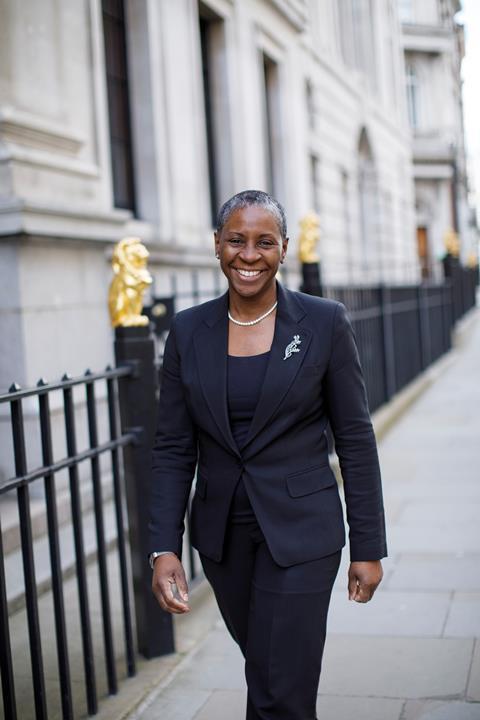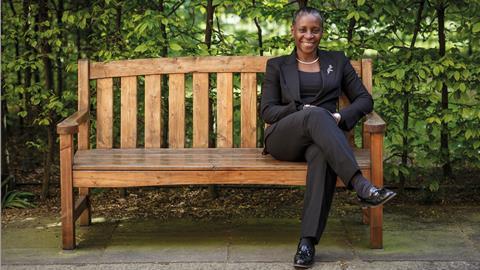‘We are the fourth emergency service, keeping the wheels of justice turning’, says the Law Society’s longest-serving president
The Law Society is unusual among professional bodies in that the presidency is not a mainly ceremonial role. Pressing the flesh on the law’s own ‘rubber chicken’ circuit is certainly in the job description, but it is only a single paragraph. Now more than ever, the president is the personification of the solicitors’ profession, both in the media and in person.

The Society’s chief executive – once the secretary-general – remains firmly ‘behind the arras’, running the secretariat. That has not always been the case. Some CEOs have been decidedly public-facing in the past, for better or occasionally worse.
For the aspiring president, then, ascending to the role of deputy vice president kicks off a two-year ‘dress rehearsal’ for a job which can turn into an endurance test. For 12 months (or longer, see below) the president is the Law Society.
I. Stephanie Boyce, whose presidential term ended this week, told me her ‘most restful moments’ in office came when she was sitting on a plane with no Wi-Fi. Back on terra firma, she was in constant demand. Her presidency began in front of a computer screen, eight hours a day, hosting meetings and delivering speeches during lockdown. It ended with a militant broadside on criminal legal aid which has no precedent in Chancery Lane’s near 200-year history.
It has been quite a journey, in short. But that was not unexpected. For Boyce chalked up three notable firsts. She was the Society’s first Black president and first woman of colour. But she is also the longest-serving president, having assumed the office several months early when David Greene stepped aside in March 2021.
I start at the beginning. Boyce made it her mission to leave a profession ‘more diverse and inclusive than the one I entered’. To what extent has she succeeded?
‘We are now talking about different things in different spaces that we haven’t necessarily talked about before,’ she responds, ‘such as around social mobility in particular.
‘I am proud of the way the profession has galvanised itself here.’
She cites Chancery Lane’s commitment to the Social Welfare Solicitors Qualification Fund, a project led by the City of London Law Society to fund a new generation of social welfare lawyers. The Society will next month commit £20,000 to the scheme, which helps pay for Solicitors Qualifying Examination (SQE) preparation courses and assessments.
This takes us to the related subject of equality of opportunity, an aspiration which still seems as far away as ever at the entry level. The SQE, whose introduction came during Boyce’s tenure, was intended to create a level playing field. Yet the pitch remains stubbornly lopsided, as statistics published only last week demonstrate. Of candidates who sat SQE1 in July, the pass rate was 23% for Black entrants, 54% for Asian/Asian British candidates and 63% for white candidates.
Why? These are woeful disparities. The Solicitors Regulation Authority has already commissioned the University of Exeter to research the factors driving the attainment gap. But Boyce says the profession is becoming impatient.
‘When I think of the theme of October’s Black History Month – action, not words – that has been the guiding principle of my presidency. The SRA needs to [act] because people are losing faith.
‘Don’t get me wrong, some people have told me that the SQE is the best thing to have happened to them. I did an admissions ceremony last Friday and we are seeing the first cohorts of those who have come through the SQE, through solicitor apprenticeships. That will help.
‘But we need to look at the here and now as to why these disparities continue to exist. SQE was supposed to remove artificial barriers to qualification. They say, you know, “it is new and will take time to bed in”. But there are people who are tired of that. They want to see action, not words. “Tell us how you are going to solve this”.’
Is a solution within the SRA’s gift, I wonder? The legal profession must be viewed through the prism of the society of which it forms a part. There is plenty of research showing that the postwar dream of doing better than your parents has faded, with the UK now a country where opportunities to move up are increasingly dependent on background.
So what can the regulator realistically do?
‘One of the areas they need to look at is how the exams are set,’ says Boyce. ‘What adjustments are made? I’ve been to schools where 80% of the cohort do not speak English as a first language. I’m not talking about creating a two-, three- or four-tier system. Whatever system it is we throw up in the air and falls back down, it [needs to be] one that is equally fair to all, regardless of their starting point.
‘We also know that the lack of funding around the SQE is a differentiator. Paying for the training courses, the refreshers, whatever you want to call them. What we don’t have at the moment is secure funding from the government, from major financial institutions, and without that commitment, people who cannot fall back on the “Bank of Mum and Dad” don’t have options.
‘We have got to look at how we get funding into the SQE. The government could change the way apprenticeship levies are distributed so that more can be done with them and more individuals can make use of them.
‘[The Law Society’s] Diversity Access Scheme last year made 15 awards to support talented, aspiring solicitors to pursue their legal education and careers. More businesses, and not just law firms, could be offering sponsorship to fund aspiring solicitors. We must as a profession reflect the communities we are seeking to serve.’

Boyce knows what she is talking about. She was brought up in a single-parent household on a council estate. Her mother came to England in 1967 aged 15 to join her parents, who had emigrated here. In her teens, Boyce’s family relocated to the US, where she spent six years before returning to the UK to study law.
‘When I left law school I remember someone saying to me, my debt is bigger than their mortgage,’ she recalls ruefully. ‘And that was with a maintenance grant and no tuition fees. I remember going on marches saying I wasn’t going to pay [the student loans] back. Of course, I did pay them back. Because I wanted to do this [be a solicitor], I borrowed that money.’
The same impatience to which Boyce alludes also applies to the relatively low proportion of Black and minority ethnic solicitors who are to be found in senior roles at both the biggest firms and on the bench. ‘I had a meeting last week where someone said, “give it 10 years, and everything will change”. But quite frankly, 10 years is too long.’
Diversity must be a priority ‘for each and every one of us’, she concludes. But for now, it remains a work in progress. So I ask Boyce to identify a ‘big win’ during her term of office.
‘The Solicitors Indemnity Fund,’ she replies with alacrity.
This was indeed a lobbying triumph for Chancery Lane (and others, as Boyce acknowledges). Until it actually happened, persuading a not notably conciliatory SRA not to remove vital protection for retired solicitors against negligence claims once their run-off cover expires looked unlikely.
Underlying that success was a growing willingness to speak convincingly in what the Society perceives to be the public interest. A replacement for SIF will also protect consumers who suffer loss from the negligence of a solicitor but cannot claim under the law firm’s indemnity insurance because the firm has been closed for more than six years with no successor. Hitching watchdog the Legal Services Consumer Panel to Chancery Lane’s cause may have been a turning point in a saga that has dragged on for years.
‘Someone said to me the other day that one thing they particularly like about the Law Society of late is that when we talk, we don’t just talk about solicitors but also the public interest,’ says Boyce. ‘That is something I am proud of, because we need to tell people over and over what it is we do.’
This underpinned another coup for Chancery Lane that preceded Boyce’s presidency – persuading the government to designate legal practitioners as ‘key workers’ during the Covid-19 crisis.
She adds: ‘I consider us to be the fourth emergency service, because we kept the wheels of justice turning during the pandemic. It wasn’t readily understood why we play a vital role and the public doesn’t always understand. That’s why the campaign around criminal legal aid has got such a response. We’re not all fat cats living in big houses, driving fancy cars, you know?’
As she makes way for her successor Lubna Shuja, what next for I. Stephanie Boyce?
‘I am going to rest!’ she replies. ‘I am going to reacquaint myself with home and family. It’s been 19 months – actually longer, since I’ve been doing this full-time since I was [deputy vice president-elect]. I’ll take some time to reflect. I won’t be rushing into anything, so watch this space.’
This article is now closed for comment.
































3 Readers' comments